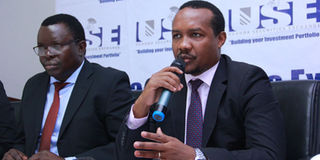USE becomes public limited company

Uganda Securities Exchange (USE) chief executive officer Paul Bwiso (right) and Capital Markets Authority director market supervision David Ogong during the official launch of USE demutualisation in Kampala on Tuesday. PHOTO BY MARTIN LUTHER OKETCH
Kampala. The Uganda Securities Exchange (USE) is now a public company limited by shares.
The development will see the bourse introduce new products in the market and subsequently become more profitable.
The above development has come about because of the demutualisation process that has been ushered in based on the legal requirement in place.
Demutualisation means that the ownership of the exchange has been separated from the trading rights of its members (stock brokers).
Officials say this will allow for independent, transparent and flexible governance structure that fosters decisive actions in response to all the changes in exchange’s business environment.
Making a presentation at USE headquarters Nakawa Business Park on Tuesday, the USE chief executive officer, Mr Paul Bwiso, said following the passing of the Capital Markets Authority (Amendment) Act 2016 on May 20 2016, demutualisation of USE became a regulatory requirement to be fulfilled within two years from that date and hence the USE is required to comply by law by May 20 2018 to be fully demutualised company.
Demutualisation is also a term used to describe the transition of a securities exchange from a mutual association of exchange members operating on a not for profit basis to a limited liability, for - profit company accountable to shareholders.
Mr Bwiso said essentially, demutualisation separates ownership (and voting rights) from the right to access trading.
He added that they will introduce new products like derivatives Electronic File Transfer (EFT), data vending mills, on top of becoming more competitive.
He also hinted that something new will be coming soon in USE (market) for the general public to participate in.
The bourse is now like the other stock exchanges in the East African region which have witnessed similar processes.
Mr Bwiso said: “The first Exchange to Demutualise was the Stockholm Stock Exchange in 1993. Nairobi Securities Exchange demutualised in 2011 and listed in 2014. Dar es Salaam (DSE) demutualised in 29 June 2015 and self-listed on 16 May 2016 Rwanda Securities Exchange (RSE) Demutualised from the start 7th October 2005. Started businesses 31st January 2011, over 100 stock exchanges have demutualised to date.”
Explaining the feature of USE under demutualisation, Mr Bwiso said there is going to be more flexibility in the governance structure, access to wider sources of finance and self-listing rigorous regulatory oversight.
The other features are: wider stakeholder participation, a wider range of investment products and sources of revenue, more efficient and competitive business environment that encourage innovation, greater transparency and accountability.
Mr Bwiso said the structure of the Demutualised Exchange Incorporated on May 18, 2017 as a Public company Limited by Shares Authorised share capital of Shs1b of 100 million shares of a nominal value of Shs10 each’ Issued share capital is Shs42m of 42 million shares. Each shareholder has 6,000,000 shares at a nominal value of Shs10 each.
Presenting the Structure of the Demutualized Exchange; Mr Bwiso said the initial shareholders/promoters are African Alliance Uganda Ltd, Baroda Capital Ltd, Crane Financial Services Ltd, Crested Capital Dyer and Blair Uganda Ltd, Equity Stock Brokers Ltd and UAP Financial Services Ltd.
The director market supervision Capital Markets Authority (CMA) Uganda, Mr David Ogong, said Uganda has been developing its capital market in the past years.
“To develop an economy, you need capital. We have been steadily developing our capital market to make it attractive to the investors,” he said.
Ms Gertrude Wamala Karugaba of Sebalue & Lule Advocates, the legal advisor, said USE has become public company limited shares. “We hope sooner than later there will be listing of exchange so that Ugandans can benefit from the process,” she said.
The chief executive officer of Crested Capital, who is also one of the directors of USE, Mr Robert Baldwin, said demutualisation of USE will allow it to do so many things in the coming years adding the model behind is profitability.


